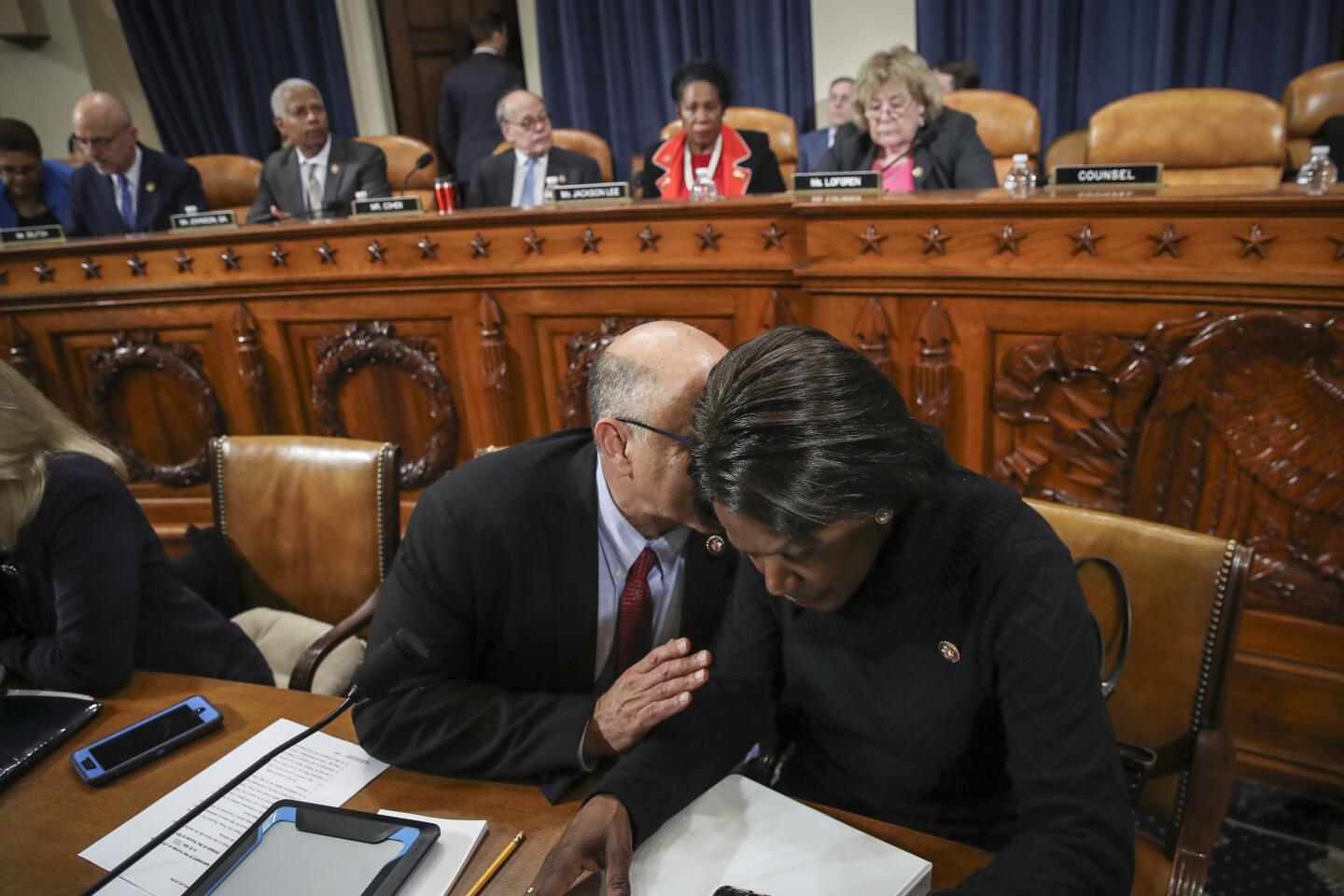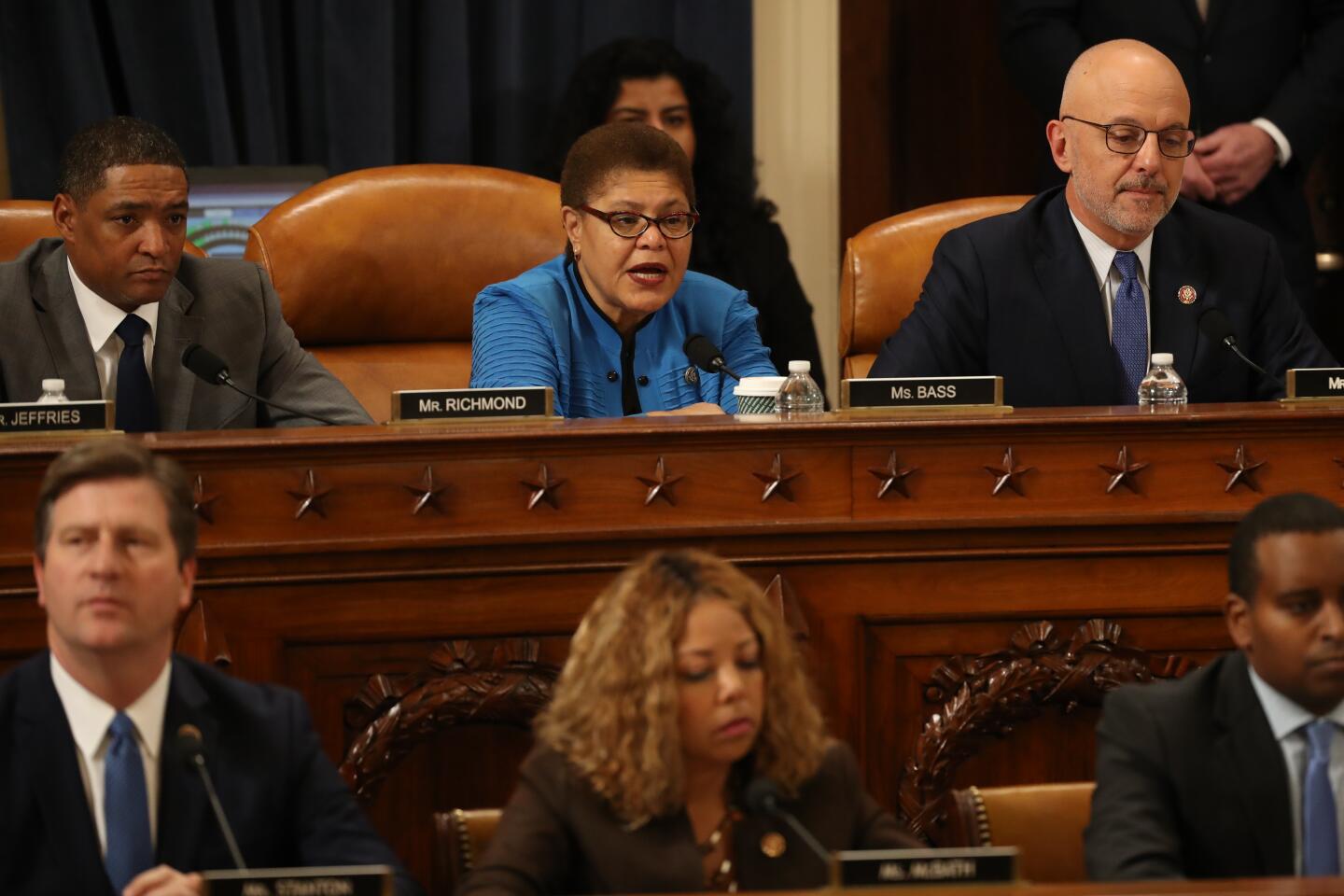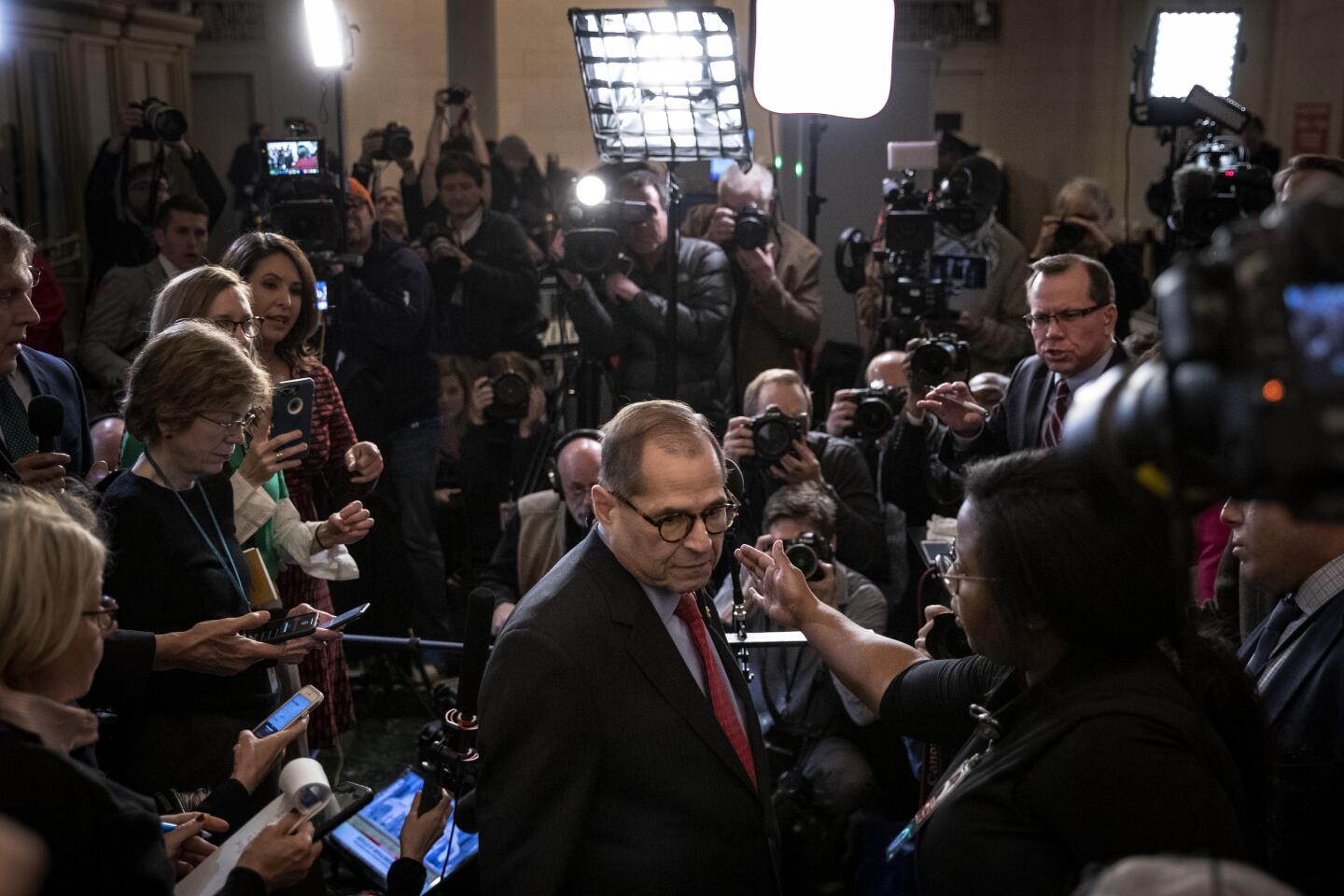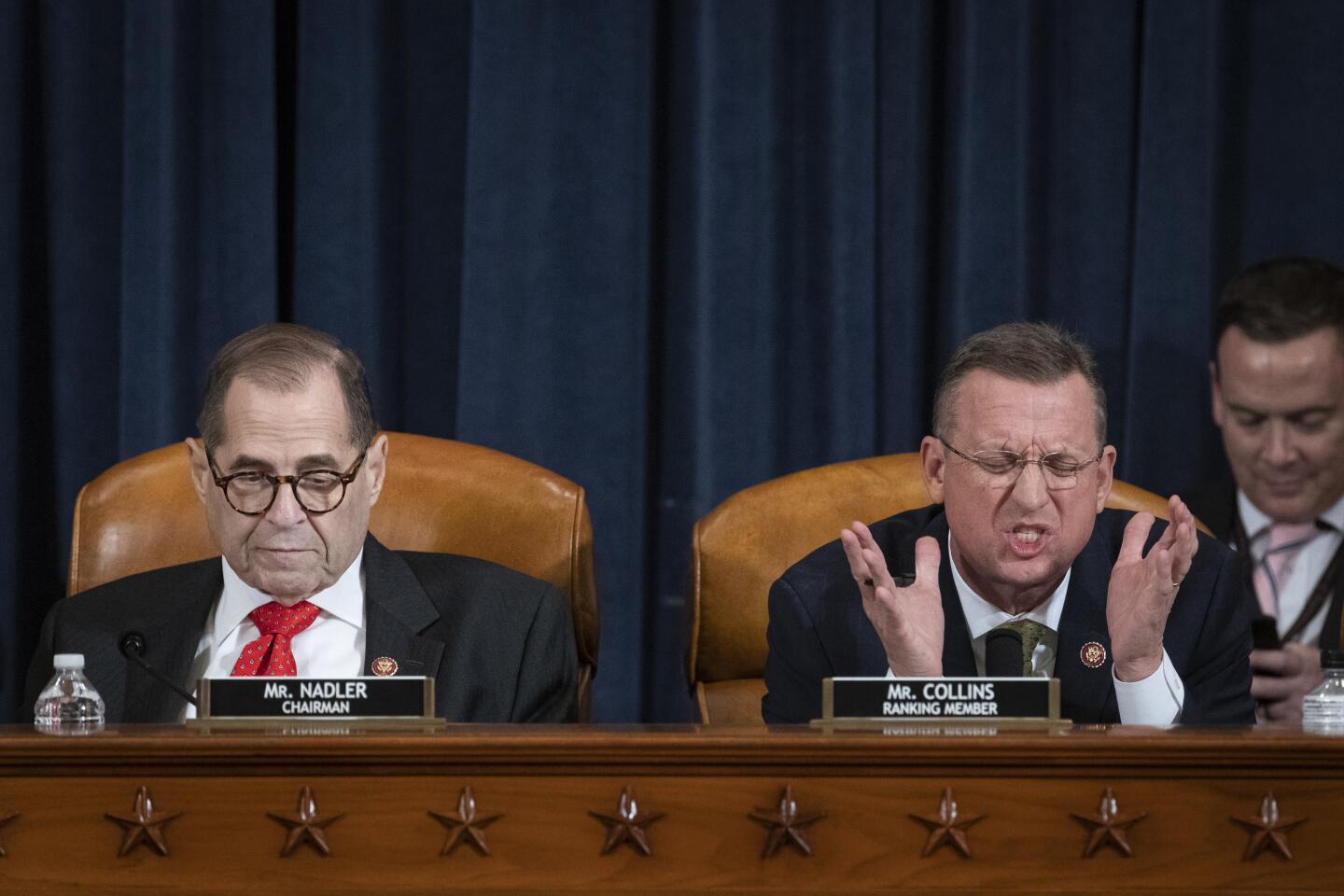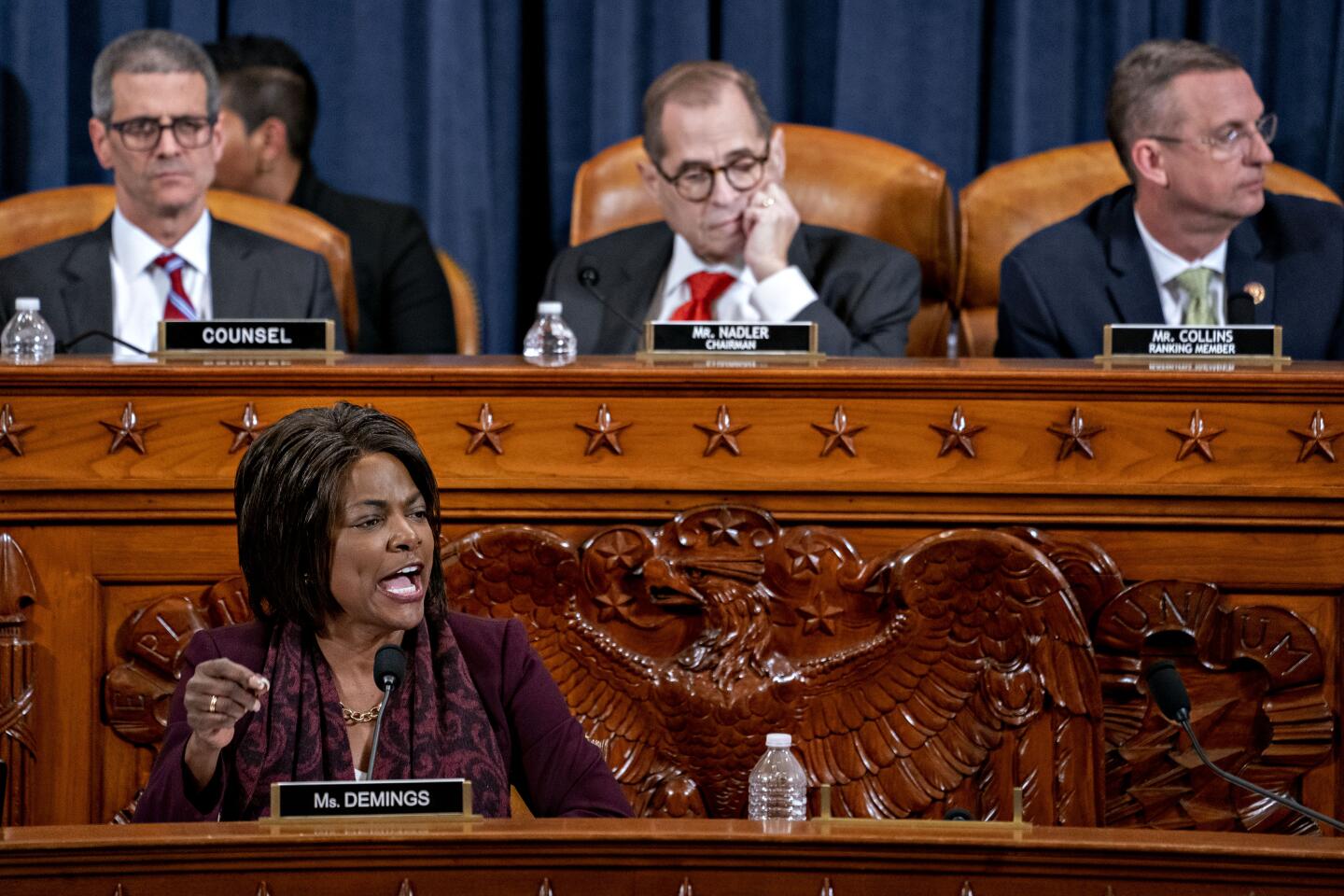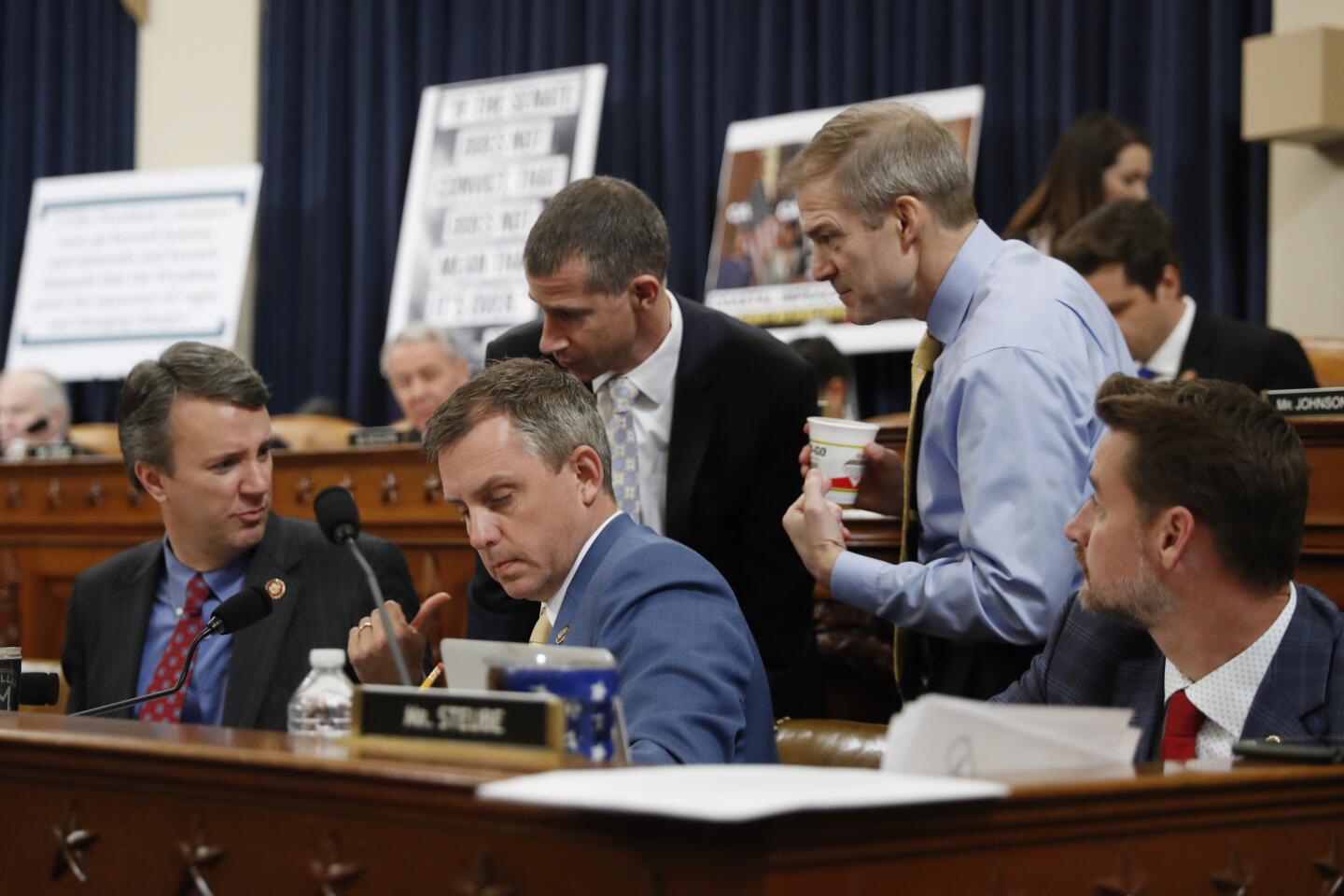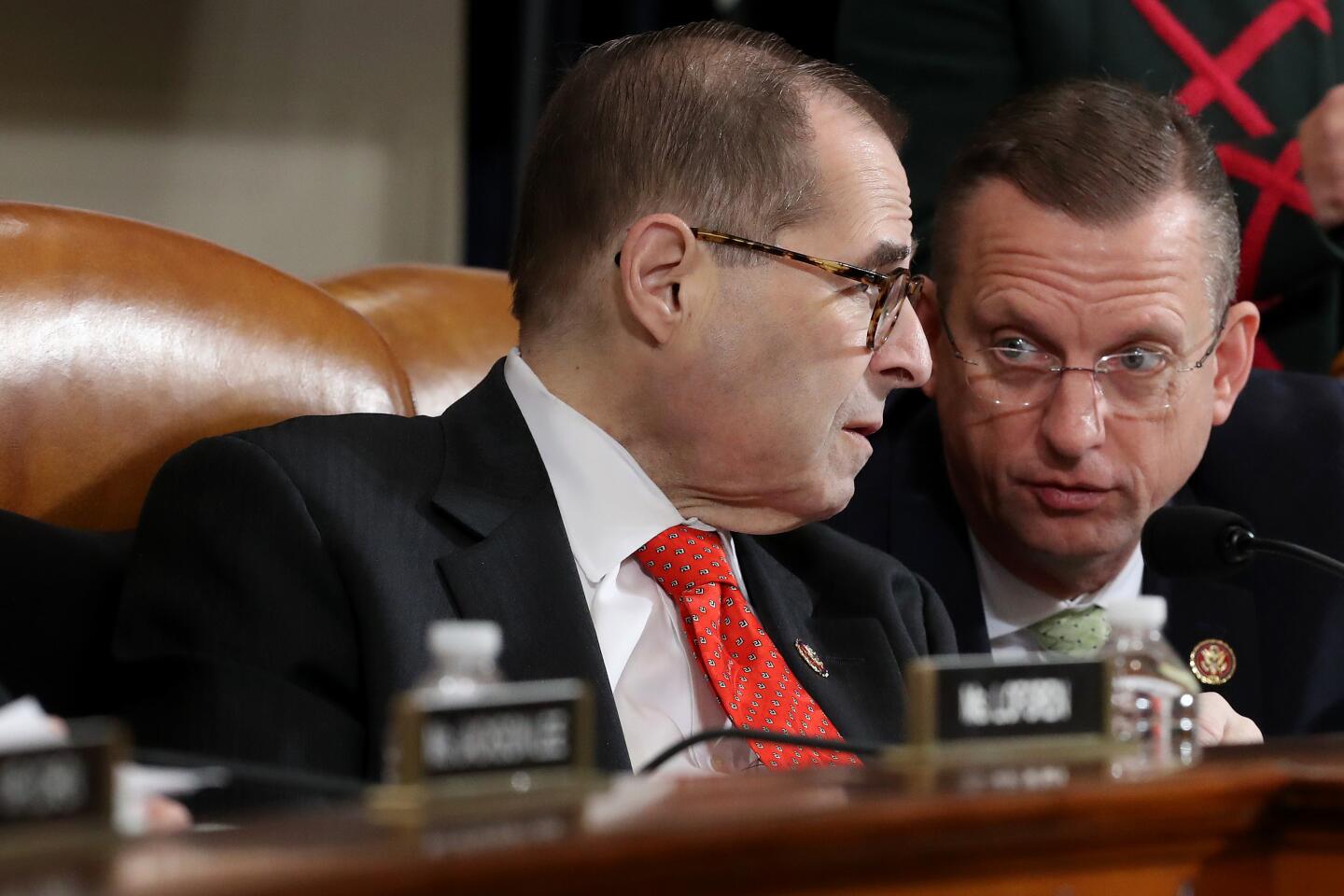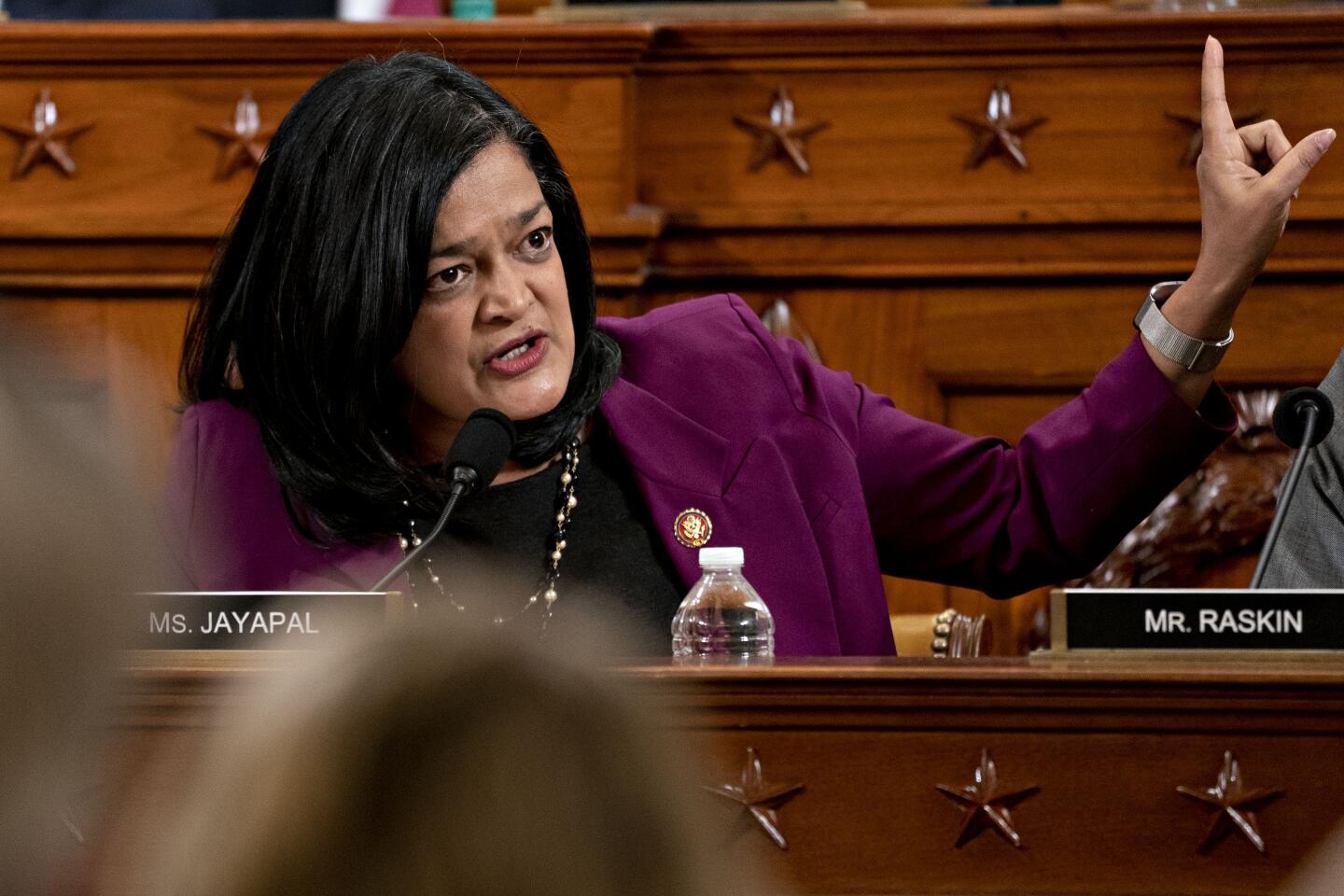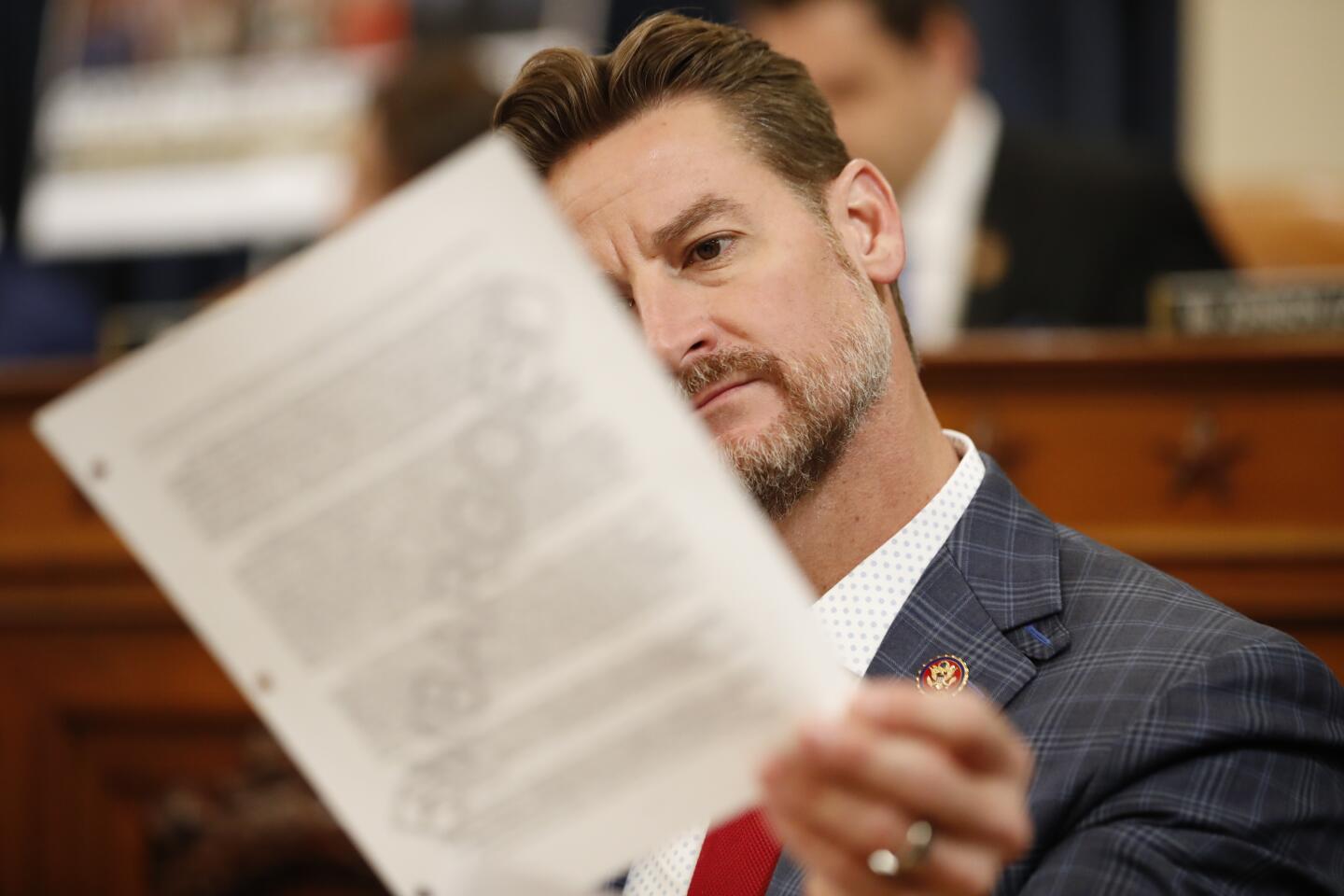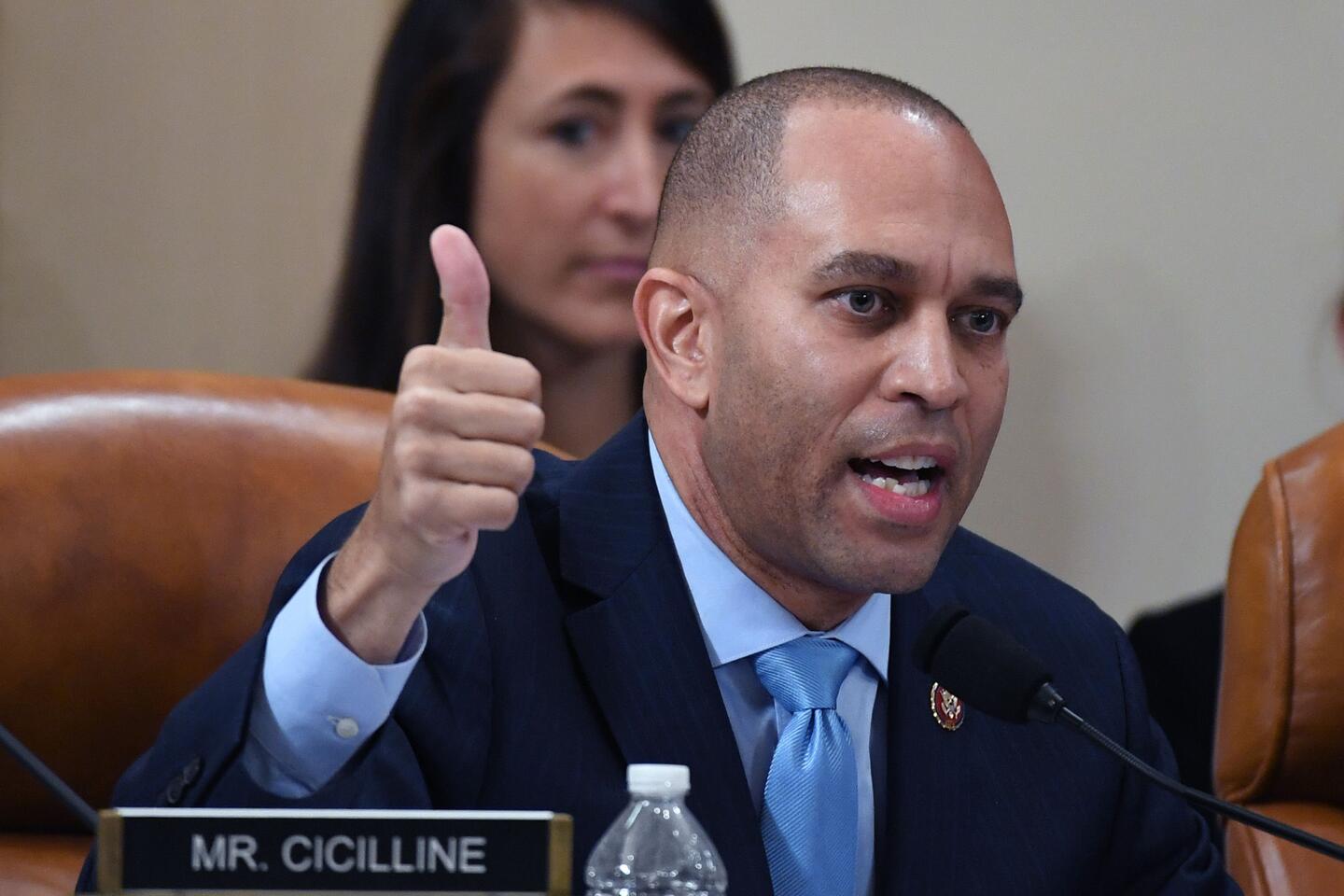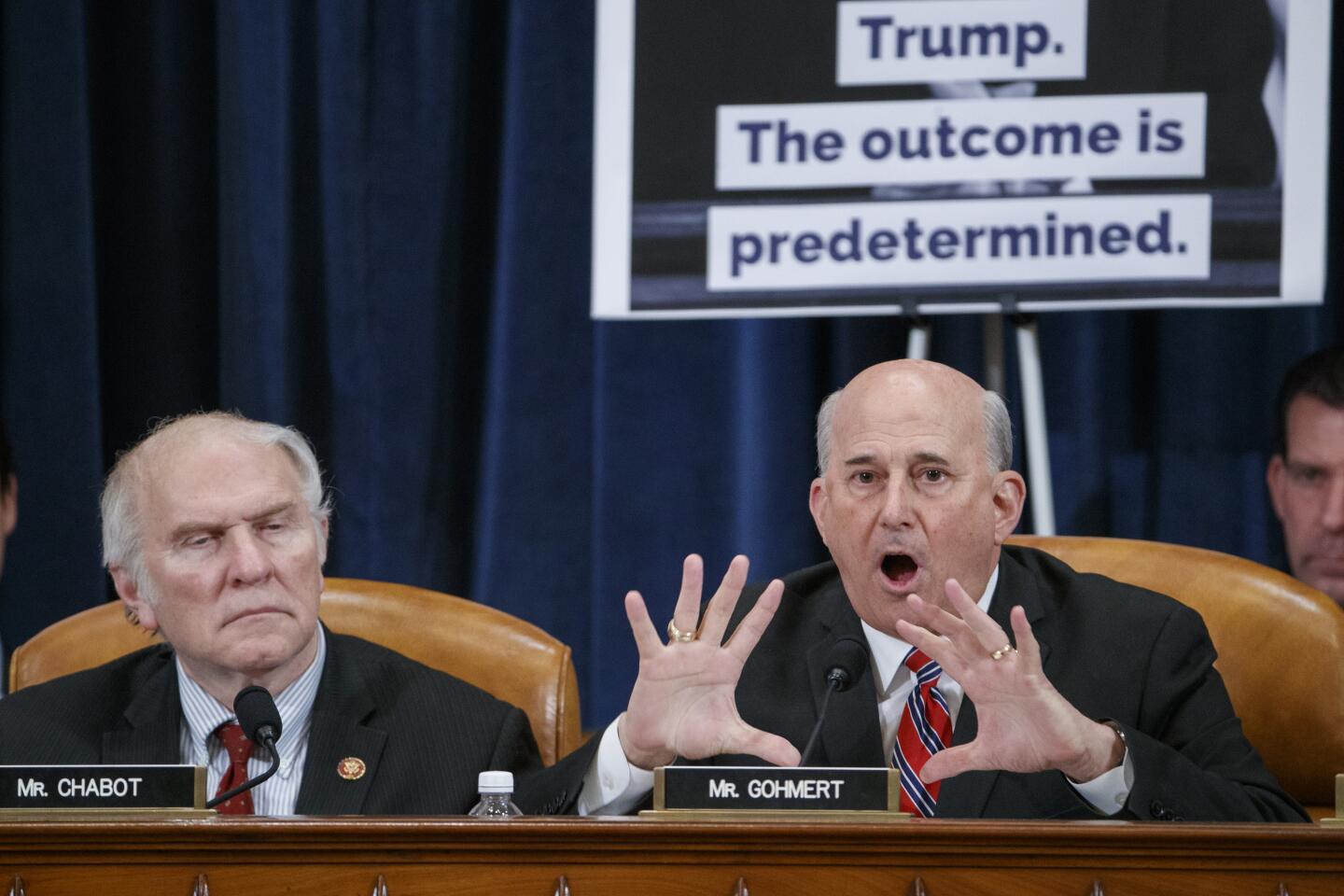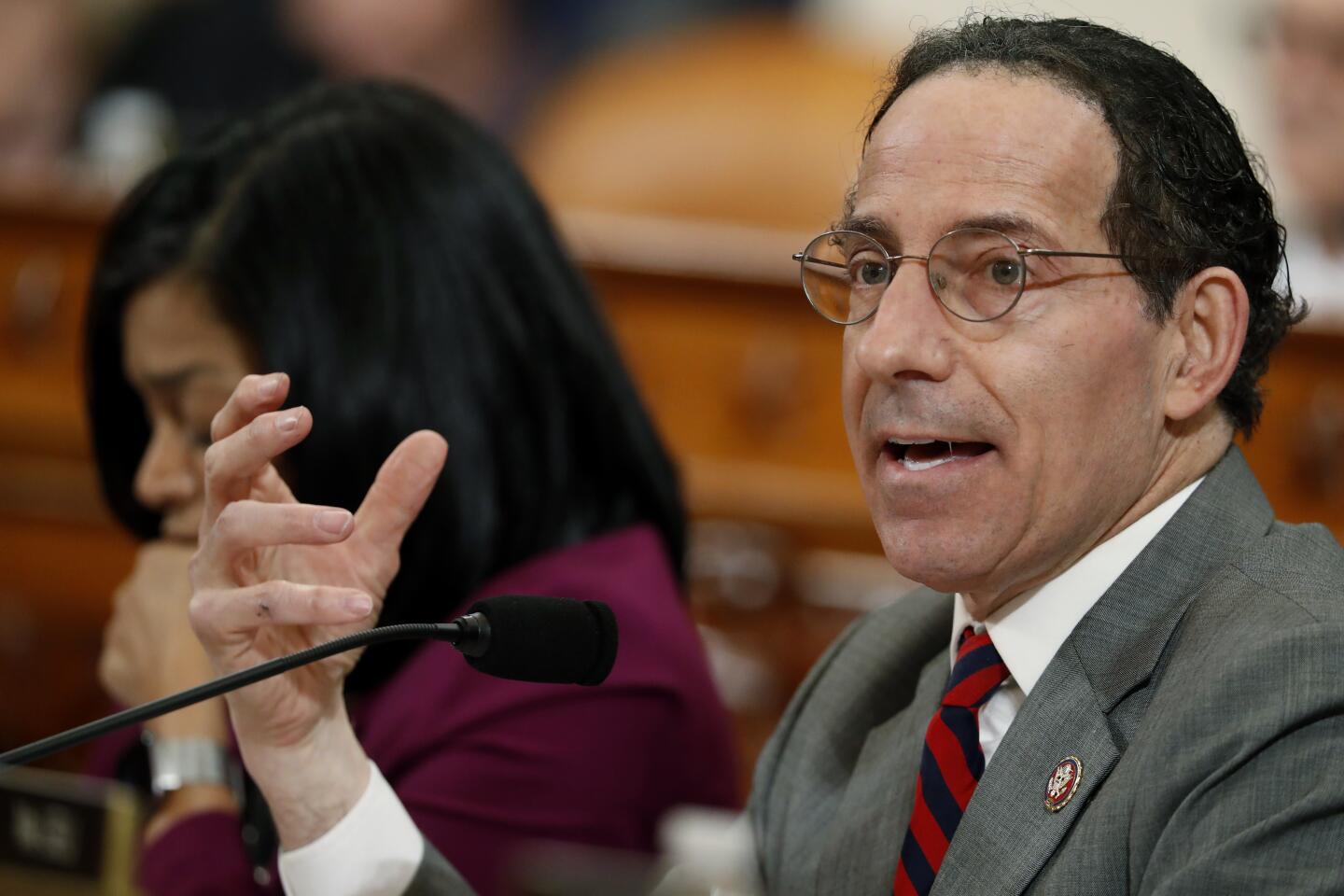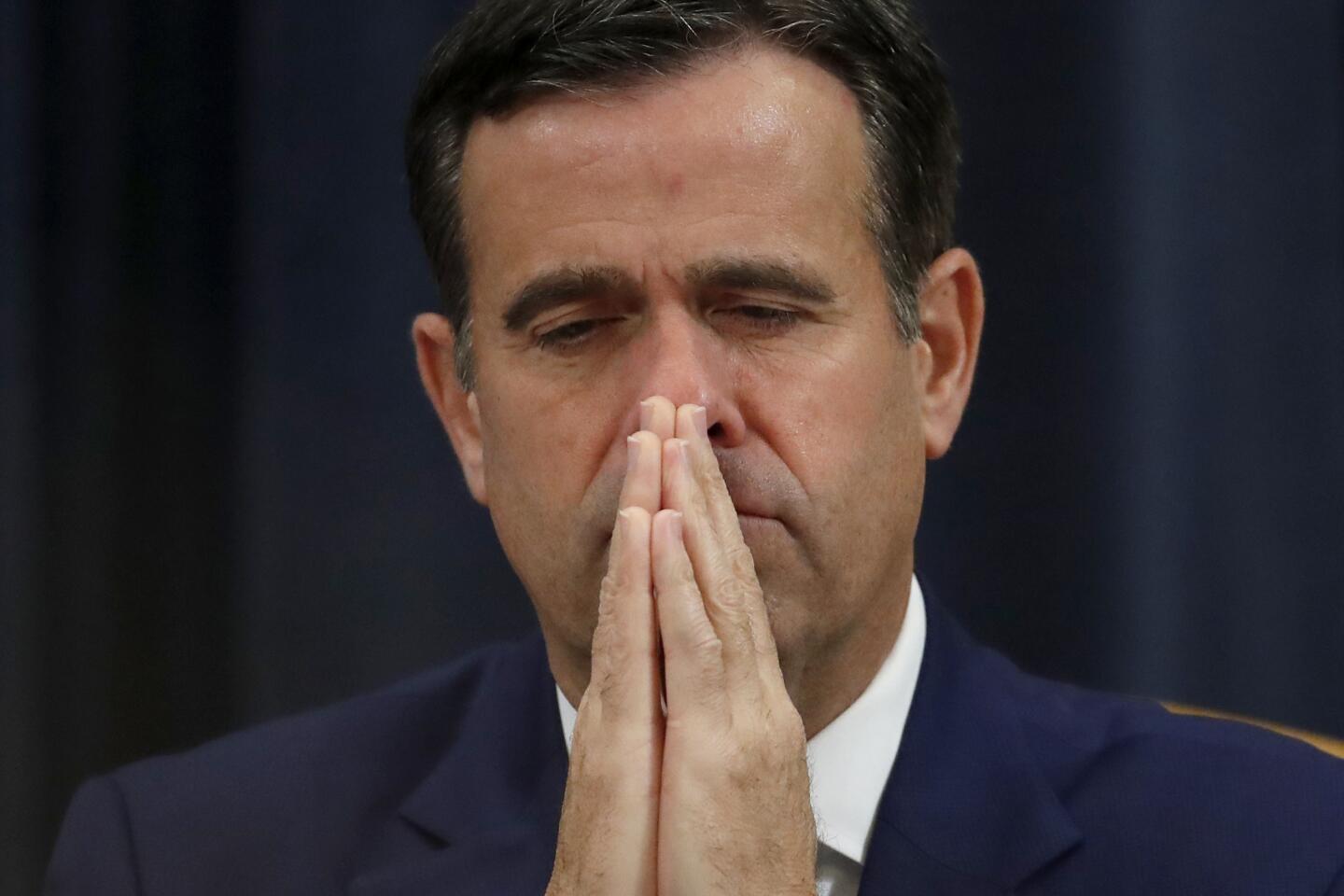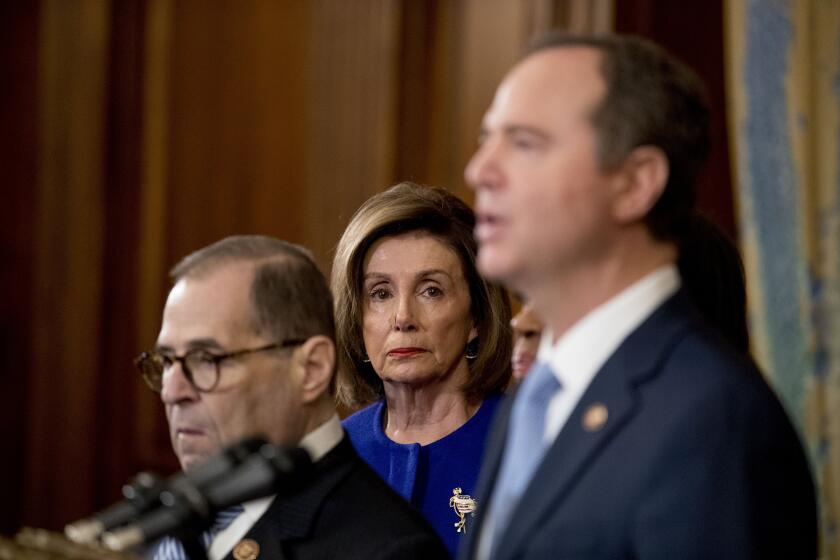Judiciary Committee sends impeachment articles of President Trump to House floor

The House Judiciary Committee approved articles of impeachment against President Trump, setting up a vote by the full chamber next week.
- Share via
Washington — The House Judiciary Committee approved two articles of impeachment against President Trump on Friday, setting up a vote by the full chamber next week that is likely to make President Trump the third U.S. president to be impeached.
The articles — accusing the president of abuse of power and obstruction of Congress — relate to Trump’s attempt to have Ukraine investigate his political enemies while he was withholding nearly $400 million in military aid to the country, a scheme Democrats described as an invitation for a foreign power to meddle in a U.S. election.
“Today is a solemn and sad day,” Rep. Jerrold Nadler (D-N.Y.), the committee chairman, said in brief comments to reporters after the votes.
Nadler surprised Republicans late Thursday night by concluding the hearing after 14 hours of withering debate, delaying the vote until Friday morning to defang a potential Republican claim that the Democrats were voting in the dark of night when most Americans weren’t watching.
He urged members to “to search their consciences” before making their decision, but the votes on both counts broke along party lines as expected — all 23 Democrats voted yes and all 17 Republicans voted no.

Republicans told reporters after the votes that Democrats would pay a political price for what they called a blind pursuit of the president rooted in frustration he won the 2016 presidential election.
“They predetermined they were going to do it, and they did it,” said Rep. Debbie Lesko (R-Ariz.). “They had no proof, no evidence, no crime. But they went ahead anyway, and they’re tearing the country apart. And they should be ashamed.”
The Democratic-controlled House is expected to weigh “H. Res. 755, Impeaching Donald John Trump, President of the United States, for high crimes and misdemeanors” on Wednesday or Thursday of next week, with the impeachment expected to pass nearly along party lines.
The abuse of power article relates to the pressure campaign on Ukraine. The obstruction of Congress article relates to Trump’s refusal to cooperate with the impeachment investigation and his blocking federal employees and federal agencies from providing Congress with testimony or documents.
Passage would set up a trial in the Republican-controlled Senate in January, which is all but certain to acquit the president and leave him in office.
House Democrats are politicking for coveted roles prosecuting Trump in upcoming Senate impeachment trial.
“This desperate charade of an impeachment inquiry in the House Judiciary Committee has reached its shameful end,” White House Press Secretary Stephanie Grisham said in a statement. “The president looks forward to receiving in the Senate the fair treatment and due process which continues to be disgracefully denied to him by the House.”
There have been disagreements among Republicans about how to handle the trial, and some of Trump’s fiercest allies want a drawn-out process with witnesses.
“I understand their desire to just get it behind us. But the country needs to hear what a farce this was,” said Rep. Louie Gohmert (R-Texas).
Senate Majority Leader Mitch McConnell (R-Ky.) has sent signals that he would prefer a short trial, but said Thursday night that he would work with the White House to design the rules for the trial.
“I’m going to take my cues from the president’s lawyers,” he told Fox News.
Trump insisted to reporters in the Oval Office on Friday that he didn’t care about the length of the trial.
“We did nothing wrong,” he said. “So I’ll do long, or short.”
Rudolph W. Giuliani, the president’s lawyer who arrived at the White House shortly before Friday’s vote, sent a text message saying, “either way it’s bull.”
McConnell’s comments about coordinating with Trump’s lawyers outraged Democrats, who accused him of abandoning his duty to conduct a fair process.
“If Senator McConnell is saying there’s no chance that there’s a conviction and he’s coordinating with the White House, he essentially has surrendered the constitutional mandate that the Senate conduct a trial,” said Rep. Jamie Raskin (D-Md.).

After weeks of investigations, public hearings and nightly sniping on cable news, the final marathon session in the Judiciary Committee featured the most direct confrontation yet between members of Congress over whether Trump’s actions merit impeachment and removal from office.
In Thursday’s 14-hour session, called a markup, Republicans floated amendments to eliminate or water down the impeachment articles, forcing lengthy debates on at times unrelated topics that inevitably ended with Democrats swatting down the proposals.
With no witnesses to question and little chance of substantive changes, the markup session — which began Wednesday night and spread over three days — rambled across topics from what the Founding Fathers would have wanted to whether the Clinton impeachment should have happened. .
“No matter what they threw at the wall, no matter what spaghetti they were throwing at the wall, it wasn’t sticking because it’s not real,” Rep. Pramila Jayapal (D-Wash.) said of Republican attempts to derail the process. “And so I think we just have to continue to bring it back to the facts.”
Democrats maintained that they were reluctant to impeach Trump, but argued that Congress serves as the last line of defense against a presidency that they say has veered out of control.
“This is a moment of personal conscience,” said Rep. Sheila Jackson Lee (D-Texas). “This is a moment where we had to hold the president accountable.”
Republicans said it is Democrats, not the president, who overstepped their authority in their push for impeachment. They said the case against Trump was the product not of careful investigation, but intense hatred of the president and his supporters.
The two articles of impeachment against President Trump don’t mention Russia, but Moscow’s meddling in 2016 underlies the current constitutional crisis.
Democrats’ case against Trump focuses on his push for Ukraine to launch investigations that would help him politically. He pressed Ukraine to announce an investigation of Joe Biden, his son Hunter and Burisma, the Ukrainian gas company on whose board Hunter Biden sat. The former vice president could be Trump’s Democratic opponent in next year’s election.
Trump also wanted Ukraine to investigate a debunked conspiracy theory involving the Eastern European country and the hacking of Democratic Party emails in 2016, an operation that was carried out by Russia.
Trump “betrayed the nation by abusing his high office to enlist a foreign power in corrupting democratic elections,” according to the articles of impeachment. He also “abused the powers of his high office” by directing administration officials to defy congressional subpoenas.
Republicans have repeatedly pointed out that Ukrainian President Volodymyr Zelensky has said publicly he wasn’t pressured by Trump. But Nadler noted Ukraine, which continues to rely on U.S. military aid and support in its war with Russian-backed separatists, may by reluctant to openly challenge Trump’s version on events.
Democrats also say the act of asking a foreign government to get involved in a U.S. election is an abuse of power regardless of whether that government’s leader is willing to say that he felt under pressure.
Times staff writer Noah Bierman contributed to this report.
More to Read
Get the L.A. Times Politics newsletter
Deeply reported insights into legislation, politics and policy from Sacramento, Washington and beyond. In your inbox three times per week.
You may occasionally receive promotional content from the Los Angeles Times.


